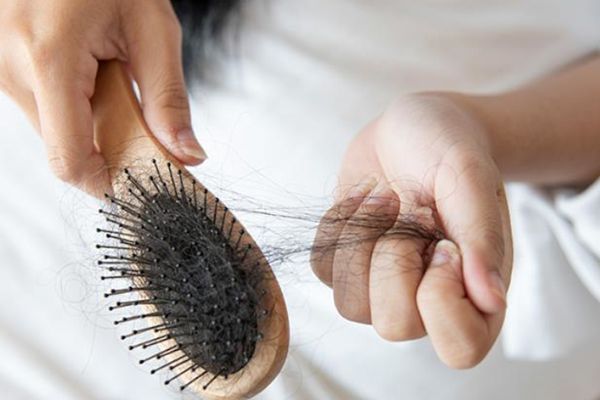Estimated Read Time: 6.33 min.
Reading time : 6 min
Hair loss is a cause of concern for many people of all genders and ages. Different types of alopecia are distinguished depending on the causes involved; Some of these factors have a genetic component, but others have an environmental component, determined by climatic circumstances, exposure to high levels of stress, and eating habits.
Although it is true that it is somewhat more common in the male gender, women also experience its total or partial loss for different reasons that we will analyze throughout this article.
1. Main causes of hair loss
Starting from the premise that hair loss is multifactorial , I can extract common patterns in dealing with patients who come to the office with the fear of seeing excessive amounts of hair on their pillow, drain or brush again!
1.1. Genetics
The evidence points to the fact that most cases of male pattern baldness are due to the activity of certain genes that act with some dysfunction when it comes to regulating androgens such as testosterone and dihydrotestosterone, hormones that play an important role in hair growth. hair.
The androgen receptor AR gene , as its name suggests, makes androgen receptors that attach to hair follicles. When this gene doesn't work properly, hair growth stops working as well.
Androgen receptors regulate the degree of stimulation of hair follicles by dihydrotestosterone (DHT); That is why the hyper-stimulation of this testosterone derivative enhances hair loss.
1.2. Hormonal changes
Testosterone is the primary male sex hormone , linked to its ability to drive strength, muscle gain, and sexual drive processes.
We often hear claims that baldness is linked to high testosterone levels . However, it is a matter subject to controversy and, once again, by making statements of the "black and white" type, we are falling into a deep reductionism.
A 2018 study of 239 Chinese men found that those with male pattern baldness had higher levels of free testosterone. But another study of 373 German men found " no association between sex hormones and hair loss in men in the general population ."
If baldness is a reliable indicator of high testosterone levels, this correlation would be reflected everywhere. That said, it is also true that it is not surprising to find hair loss in women with Polycystic Ovary Syndrome (PCOS), a hormonal disorder that affects a percentage of women of childbearing age, in which one of its diagnostic criteria is precisely the high production of androgens such as testosterone.
Other hormones that deserve special mention in hair loss processes are:
- Thyroid hormones (TSH, FT3, FT4 and FT3). People with hypothyroidism typically experience hair loss that improves as their thyroid axis balances out.
- Insulin : hormone produced by the pancreas, responsible for the balance of blood sugar, are related to hair loss in both men and women given its important involvement in the alteration of sex hormones.
- Cortisol : hormone related to the alarm-flight processes of our body. As we will see later, the correct management of our stress levels is going to play a very relevant role in our hair health.

1.3. nutrient deficit
Nutritional deficiencies are directly related to hair loss, specifically associated with the consumption and/or insufficient absorption of:
- Arginine: it is an amino acid precursor of nitric acid that, thanks to its vasodilator capacity, enhances blood flow so that it reaches the hair follicles and thus stimulates hair synthesis. Evidence indicates that arginine is capable of preventing the debilitating effects of hydrogen peroxide on the hair, thus protecting the natural color of the hair.
- Lysine: essential amino acid when the body is not capable of synthesizing it on its own, it must be supplied with food. Lysine promotes the production of collagen and keratin, two essential compounds for maintaining healthy, strong and shiny hair. We often find people with dry and brittle hair that have a deficiency of this nutrient.
- Zinc: essential mineral in different physiological processes. As far as hair health is concerned, it acts in synergy with copper, being essential for the synthesis of keratin, regeneration and hair growth.
- Biotin: it is vitamin B7 whose main function is to participate as an enzyme transporter in the metabolic processes of different nutrients. Its deficiency is related to dermatitis and alopecia. That is why this nutrient is essential to reinforce the hair fiber, favoring elasticity, preventing hair loss and promoting its growth.

1.4. Stress
Technically, temporary stress-induced hair loss is known as telogen effluvium . It is a type of baldness related to the frequency and state of the cycles that the hair follicle goes through , determined by environmental factors and not by genetic factors.
In this type of alopecia, most of the hair follicles are accelerated and synchronized, so that a resounding hair loss occurs in a relatively short time.
This type of alopecia is easier to reverse, and the hair can be recovered within a few months of interrupting the main cause, when the hair follicles are renewed and grow again. It rarely triggers total and permanent alopecia.

2. What can I do to stop hair loss?
Conventional hair loss treatments often include drugs such as minoxidil and finasteride. Although these drugs work under the supervision of a doctor and in certain contexts, they often have undesirable side effects that range from irritation of the scalp to sexual dysfunctions such as impotence in the case of men.
Some of my favorite natural tools to combat hair loss are:
2.1. Check your nutrition
Eating nutrient-dense, plant-based whole foods , such as vegetables, nuts, and certain fruits, provides the raw material for your body to be in optimal condition for proper hormonal balance, and consequently, to grow strong hair. .

2.2. Review your exposure and manage stress levels
Although many of us would love to, we can not go to an island and "no one bothers us." We have to learn to live with stressful situations: a boss who demands you, your children who fight, your mother who requires attention...
Choose what resonates with you and helps you manage stress . I often resort to sports, a good warm coffee with a good friend , or a good book. Choose yours!
23. Consider incorporating a dietary supplement
In parallel to the previous points, check with a trusted professional the possibility of making an extra contribution to your diet by taking a quality supplement that helps treat the root cause of your hair loss.
3. Conclusions
Are the above strategies guaranteed to prevent or reverse hair loss? Unfortunately, I would be lying to you if I told you that they are a guarantee of putting an end to this situation.
If the roots are genetic, at least until some important scientific advances are produced, it is something that you will have to live with unless you decide to resort to aesthetic treatments such as hair implants.
However, the strategies that I have mentioned are not only good for your hair, but also for your health in general, so it is never a waste of time to start implementing habits to take care of yourself from the inside out. Remember that your physical well-being is only a consequence of good inner health.
Bibliography
- Freites-Martinez A, Shapiro J, et al . “Hair disorders in patients with cancer.” J Am Acad Dermatol. 2019;80:1199-1213.
- Guo EL, Katta R. “Diet and hair loss: Effects of nutrient deficiency and supplement use.” Dermatol Practice Concept . 2017; 7:1-
- Yu V, Juhász M, et al . “Alopecia and associated toxic agents: A systematic review.” Skin Appendage Disord 2018;4:245-60.

